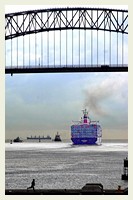
Image: AP/Wideworld
Booming international trade has fueled much of the recent economic expansion. But the giant cargo ships that ferry goods from L.A. to Taipei and ports beyond are leaving a smoggy wake.
Although cargo ships are relatively fuel efficient, they run on the dirtiest, cheapest energy source available — the “bunker fuel” that remains after gasoline and other high-grade fuels are refined from crude. Bunker fuel’s impurities, including high levels of sulfur and nitrogen, generate millions of tons of pollution that contribute to global warming and create smog near ports and at sea.
“Fourteen percent of all global nitrogen oxide emissions now come from these ships — that’s simply staggering,” says Russell Long, executive director of the Bluewater Network, a San Francisco-based environmental group. The oceanic pollution from cargo ships — which also account for 16 percent of all sulfur emissions from petroleum sources — is driven by increased traffic on the seas. Commercial ships traveled more than 20 trillion ton miles last year, a 70 percent increase since 1983, according to a Bluewater report. And as international trade expands in the next two decades, global cargo shipping is expected to triple.
Pollution from big ships is much less regulated than that from cars and trucks. Bunker fuel can contain up to 40,000 parts per million of sulfur. By contrast, diesel fuel used by U.S. trucks can have only 500 ppm, and new regulations will soon reduce it to 15 ppm. “A single container ship belches more pollution than 2,000 diesel trucks,” Long says. Some of those emissions make their way inland. A Navy spokesman told the Los Angeles Times that Ventura County in Southern California could reduce smog-causing pollutants by 72 percent if just three ships a day were diverted from the coast.
A relatively weak international treaty to control sulfur emissions was drafted in 1997 by the United Nations’ International Maritime Organization (IMO), but many countries, the United States included, have refused to sign it. Bluewater recently sued the Environmental Protection Agency under the Clean Air Act — arguing that the agency had failed to regulate ship emissions in U.S. waters. The epa responded in January by agreeing to draw up new regulations. But the battle is likely just beginning: The agency won’t say how stringent the standards will be and says it won’t regulate foreign-owned vessels — even those registered in Panama and Liberia under so-called flags of convenience.
Alan Stout of the EPA’s Office of Transportation and Air Quality says the agency has no authority to regulate foreign-flagged vessels “unless Congress gives it to us specifically.” For its part, the IMO opposes any EPA interference on the issue: “Unilateral regulations are not helpful in any way,” says organization spokesman Lee Adamson. But Long says the United States can force a change if it chooses. He points to U.S. action in the wake of the Exxon Valdez disaster, when Congress required double hulls on all oil tankers in U.S. waters — including vessels flying foreign flags.












